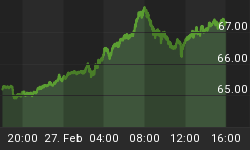The Brexit vote is this Thursday, so nothing else matters until then. And polls, just to make it even more stressful, have it neck and neck. See Brexit poll tracker back to even at 44-44.
While we're waiting, let's consider some related questions:
Would leaving the EU be good or bad for Britain in the short run? A lot of definite-sounding opinion is being tossed around on this count -- see 'Negative and substantial' impact on UK if it leaves EU: IMF -- but it's important to take such things with a grain of salt. No one has the slightest idea how such a divorce would go and if its immediate impact would be positive or negative.
Government agencies in particular view official statements as a tool for herding the masses in the proper direction. But they demonstrably suck at actual prediction. Go back through the history of Fed or IMF or ECB or Congressional Budget Office reports -- here's classic Bernanke on the previous decade's housing bubble -- and you'll see that their predictions aren't even random: Because their purpose is to shape public opinion rather than express truth, they're right even less than half the time. So question number one can only be answered with a shrug and a "who knows?"
Would Brexit be a big deal in the long run? Here it's easier to speculate, because market forces come into play. If one country leaves the EU then several more might do so in short order, and that might unravel the whole organization. This would produce ongoing chaos as each new election risks installing an anti-EU government and the Brexit drama is repeated continuously -- though with new names like Frexit and Sprexit. The resulting uncertainty would be bad for the value of financial assets that depend on faith in governments and central banks. All those negative interest rate bonds would behave like junk, dropping to 70 cents on the dollar as buyers demand some return to go with their risk. Equities, which trade in part with reference to bond yields, would probably also behave like junk, falling in response to uncertainty instead of rising on the expectation of central bank salvation. So bad in the long run for the current irredeemably corrupt financial system -- which is to say probably good for most regular people.
Will the Brexit vote count be fair? Almost certainly not. This is not a gratuitous jab the honesty of today's officials but a recognition of historical fact. When elections are tight, they tend to be stolen by the side with the most efficiently-corrupt machine. JFK's win over Nixon in 1960 thanks to suspiciously favorable results from Mayor Daley's Chicago is still hotly debated. In Robert Caro's biography of LBJ the author asserts (with copious attribution) that Johnson stole literally all his elections prior to the presidency (in his only losing run his opponent simply stole more votes). The recent Austrian election in which a barely-acceptable-to-the-establishment Green beat a totally-unacceptable nationalist is currently in court over allegations of fraud.
With the advent of electronic voting machines that -- get this -- leave no paper trail and so can't be verified, it's possible that there will never again be a completely fair election. And with Brexit, which European elites really, really don't want to see happen, it would be a shock if they go down without a very dirty fight.
Will Bexit matter to the euro? However the UK vote goes, the genii is out of the bottle. Other nationalist parties are gaining strength on the continent and will demand exit votes of their own. Especially in countries having trouble living with a relatively strong euro, this is a given in the next few years. How will the EU head this off? Only one way: devalue the euro aggressively to make life easier for Italy, Portugal, Spain, Greece, et al.
But how, when most EU interest rates are near or below zero and governments have already accumulated record amounts of debt (and when populations are aging out of the workforce and immigrants cause more problems than they solve) does the ECB devalue the euro? Now we've arrived at the heart of the matter, which is the shape of the next stage of experimental monetary policy. Something amazing this way comes.
Would a plunging euro equal a soaring dollar? Maybe. Since in a fiat currency world national currencies are valued against each other, when one plunges others by definition go up. This might cause US stocks, bonds, and real estate to rise for a while, but at a huge cost. The too-strong dollar has already pushed domestic corporations into an earnings recession. An even stronger dollar would crush corporate profitability, and there's no historical instance of a healthy economy in which the private sector is making less money each year.
So Bexit and its aftermath are just symptoms of a deeper problem. To paraphrase an old saying about inflation, today's political turmoil is always and everywhere a monetary phenomenon. We've borrowed too much money and now nothing works any more. Electoral turmoil is simply what you get at the tail end of an epic debt binge. In that sense it doesn't matter (within reason) who ends up being prime minister, president, or premier unless they figure out a solution for their balance sheets. And that -- assuming it's even possible -- won't be quick or easy.















